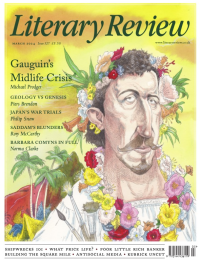David Bromwich
Enthusiasm and Its Discontents
The End of Enlightenment: Empire, Commerce, Crisis
By Richard Whatmore
Allen Lane 496pp £30
We think of the Enlightenment as a movement dedicated to the clearing away of prejudice, superstition and all the delusions that obstruct the rule of reason and the achievement of happiness. The great enlighteners – Voltaire, Diderot, Hume, Kant, Wollstonecraft, Bentham – in the usual presentation were reflective and principled men and women, a ‘party of hope’ sufficiently sceptical to endure disappointments on their way to an ultimate triumph. Their achievement seemed beyond challenge in 1770 (to pick a year at random), but by the end of the Napoleonic Wars, scientific, technological and industrial advance had somehow become separated out from the idea of moral progress. The former was now seen as an ambiguous gift, the latter a utopian promise beset by the usual hazards of human blindness and greed. Yet the ideals of the Enlightenment have had remarkable staying power. If we associate the feudal order with parochial loyalty, the duties of caste and a spirit of unquestioning self-sacrifice, the Enlightenment stands for the opposite: general equality, freedom from non-rational constraints and cooperative participation in projects to improve society as well as humanity at large. Adapted to these ends are human faculties we can recognise as a common endowment: sympathy, judgement, empirical prudence.
Richard Whatmore aims to alter our image of the 18th-century Enlightenment by showing how its heroes anticipated their own failure. The End of Enlightenment starts off with David Hume, a philosopher of moderate temperament who displayed a rare courage among the British thinkers of his time in avowing his religious unbelief. In his last days, Hume surprised his friend Adam Smith and his anxious inquisitor James Boswell by confessing himself utterly reconciled to death. He had accomplished what he wanted in life and had no fear of the afterlife. But, as Whatmore points out, the prospect of war in America had dashed Hume’s expectations of peace and the softening of manners through doux commerce. Whatmore quotes a letter in which Hume wondered how, between 1740 and 1761, Britain could have run up such a staggering debt and ‘the wise and virtuous Minister, Pitt, could contract more Incumbrances, in six months of an unnecessary War, than we have been able to discharge during eight Years of Peace’. In spite of this, observed Hume, Britain persisted in ‘the same frantic Maxims’.
Following the introductory chapter on Hume, the book offers a series of partly biographical, partly analytic sketches of the Earl of Shelburne, Catharine Macaulay, Edward Gibbon, Edmund Burke, Jacques-Pierre Brissot, Thomas Paine and Mary Wollstonecraft. The French Revolution made a rift in the social and political views of several of

Sign Up to our newsletter
Receive free articles, highlights from the archive, news, details of prizes, and much more.@Lit_Review
Follow Literary Review on Twitter
Twitter Feed
'A charming and amusing personal history'
Don't miss this brilliant @Lit_Review review of #WorldCupFever 👇
@KuperSimon's must-read footballing journey in nine tournaments is out now ⚽️🏆
Michael Taylor - The Beautiful Game
Michael Taylor: The Beautiful Game - World Cup Fever: A Footballing Journey in Nine Tournaments by Simon Kuper; Th...
literaryreview.co.uk
In the summer of 1918, the Caspian port of Baku played host to a remarkable group of Allied soldiers, sent to defend oil wells against the Ottomans.
Anna Reid recounts their escapades.
Anna Reid - Mission Impossible
Anna Reid: Mission Impossible - Mavericks: Empire, Oil, Revolution and the Forgotten Battle of World War One by Nick Higham
literaryreview.co.uk
Alfred, Lord Tennyson is practically a byword for old-fashioned Victorian grandeur, rarely pictured without a cravat and a serious beard.
Seamus Perry tries to picture him as a younger man.
Seamus Perry - Before the Beard
Seamus Perry: Before the Beard - The Boundless Deep: Young Tennyson, Science, and the Crisis of Belief by Richard Holmes
literaryreview.co.uk